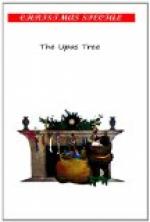“Hullo, Dick! Come in, and welcome! Sit down, old boy. I want to ask you something. Hist! Listen! That motor, which hooted in the park a moment ago, contained a policeman—so it is essential we should know whether there is any by-law in Leipzig against men, as trees, walking. Because you weren’t walking about with a man, you know, but with a Upas tree. When in doubt, ask—my wife! It would have made a sensational paragraph in the papers: ‘Arrest of a Upas tree, in the streets of Leipzig!’ Worse than ‘Arrest of the Infant of Prague.’ ... Why! Where is the Infant?”
He turned and saw his ’cello, where he had placed it, leaning against a chair.
He rose, took it up, and walked over to the piano.
“A, D, G, C. ‘Allowable delights grow commonplace!’ What did the fiend mean? C, G, D, A. ‘Courage gains desired aims.’ That’s better! We aimed pretty straight at his lying mouth.”
He opened the piano, struck the notes, and tuned the ’cello exactly as he had seen Aubrey do.
At the first sound of the strings his mood changed. All bitterness passed out of his face. A look of youth and hope dawned in it.
He carried the ’cello back to the circle of chairs. He placed it where it had stood before; then lay back in his own seat smiling dreamily at the empty chair opposite.
“Helen,” he said, “darling, I don’t really play the piano, I only strum. But there is one instrument, above all others, which I have always longed to play. I have it now. I own the ’cello I have always loved and longed for; the ’cello on which I used to play a hundred years ago. Now I am going to play to you; and you will forget everything in this world, my wife, excepting that I love you.”
He drew the Infant between his knees; then realised at once that his chair was too low.
Rising, he went over to a corner where, against the wall, stood a beautiful old chair which he and Helen had brought back, the winter before, from Italy. Its arms and feet of walnut wood, were carved into lions’ heads and paws. Its back bore, in a medallion, the Florentine fleur-de-lis. The high padded seat was of embossed gold, on crimson leather.
Ronnie placed this queer old chair in the centre of the room, facing the great mirror.
Then he clicked off the electric lights, stirred the fire, and threw on a couple of fresh logs.
The flames shot up, illumining the room.
CHAPTER XIV
“AS IN A MIRROR”
Ronnie returned to the Florentine chair, took the ’cello between his knees, placed his thumb behind its polished neck and his fingers on the ebony finger-board. He let them glide lightly up and down the strings, making no sound. Then he raised the bow in his right hand, and slowly, softly, sounded the four open notes.
Each tone was deep and true; there was no rasp—no uneven scraping of the bow.




